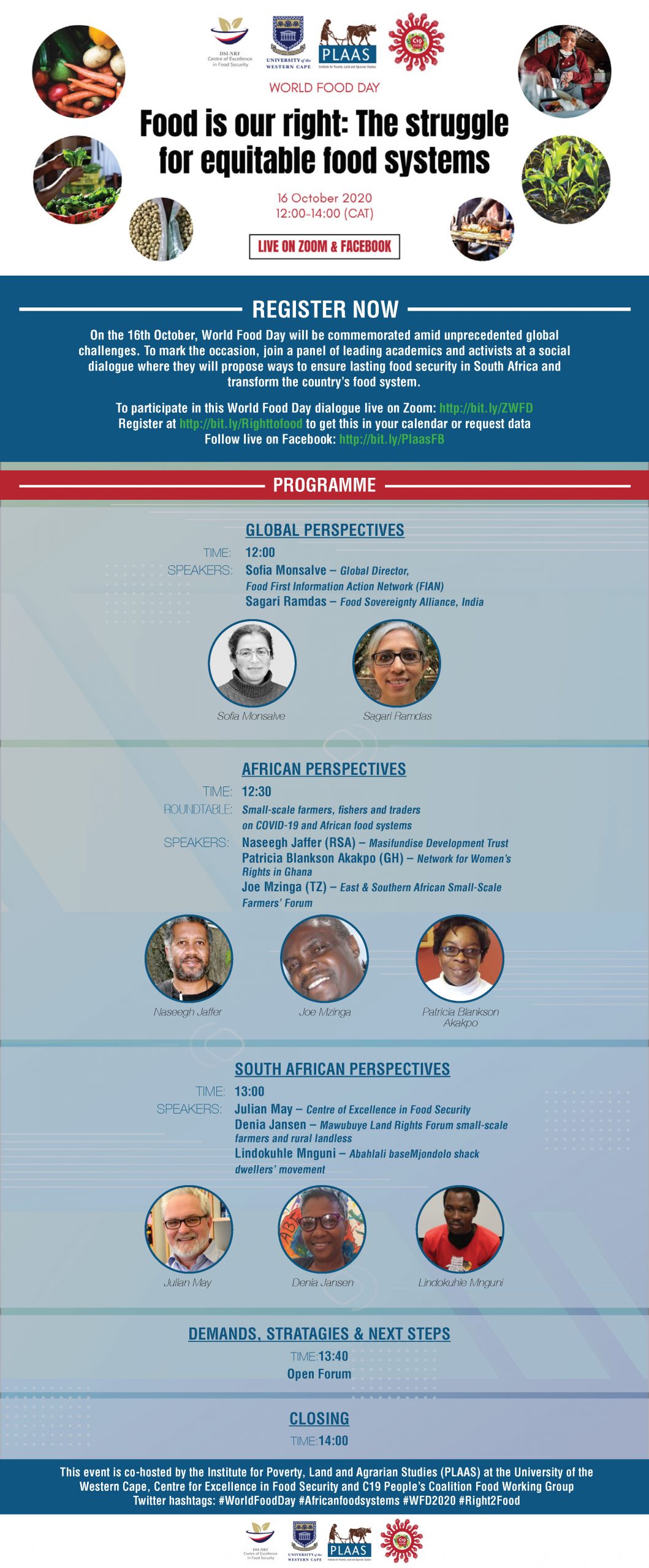With World Food Day taking place at a time of unprecedented challenges on global health and the economy, leading academics and activists will convene a digital dialogue titled: ‘Food Is Our Right! Struggles for an Equitable Food System’, from 12h00-14h00 (CAT) on 16 October 2020.
On World Food Day (16 October), academics and activists will debate and share and share insights on the impact of the food system on ensuring the right to food and ending hunger.
The Right to Food is enshrined in international agreements including the UN Declaration of Human Rights, the International Covenant on Economic, Social and Cultural Rights and the African Union’s Resolution on the Right to Food and Food Insecurity in Africa. The South African constitution also guarantees the right to food. Despite these agreements, one of the biggest challenges facing millions of people across the world today is hunger. And the food system plays a role in exacerbating these challenges.
“While many development institutions continue to prioritise improvements in productivity to address issues of hunger and malnutrition, this approach is increasingly challenged by an alternative focus: food systems.” So says Professor Ruth Hall, SARChI Chair in Poverty, Land and Agrarian Studies at the Institute for Poverty, Land and Agrarian Studies (PLAAS), University of the Western Cape (UWC).
With World Food Day taking place at a time of unprecedented challenges on global health and the economy, leading academics and activists will convene a digital dialogue titled: ‘Food Is Our Right! Struggles for an Equitable Food System’, from 12h00-14h00 (CAT) on 16 October 2020.
CLICK TO REGISTER
Jointly hosted by the PLAAS, the Centre of Excellence in Food Security (CoE-FS) and the C19 People’s Coalition Food Working Group, the online dialogue will see panellists debate and share recent and ongoing research on the devastating impacts of Covid-19; such as increased levels of hunger around the world, massive disruptions to the food system and loss of incomes to buy food.
Food is fundamental not only to well-being but to our social and economic lives. Yet, too many people do not have enough to eat. The FAO estimates that in 2019, 2 billion people in the world did not have regular access to safe, nutritious and sufficient food. In South Africa, although the country produces enough food to feed its population, access to healthy and nutritious food remains a challenge.
With the coronavirus pandemic exposing the vulnerability of millions of people in South Africa, ensuring access to safe and nutritious food, through a transformed and just food system is critical to national responses to the current global crisis
With the rising levels of hunger, poverty and inequality witnessed across the country; the protection of human rights has never been more critical. “This event is aimed at building momentum for advocating for the right to food, and mobilising to demand an end to hunger and just food systems,” explains Nandi Msezane of C19 People’s Coalition’s Food Working Group.
related Articles
COP28’s commitment to transforming farming and food systems is an insult to Africans
COP28’s commitment to transforming farming and food systems is an insult to Africans Florian Kroll, University of the Western Cape Globally,…
New book: “Resilience and Food Security in a Food Systems Context”
Resilience and Food Security in a Food Systems Context is a recently published, open-access resource which delves into why we…
“We have to mobilise around the right to food”
Photo Kamaji Ogino/Pexels. The need to mobilise around the right to food (RTF) was one of the key messages from…




